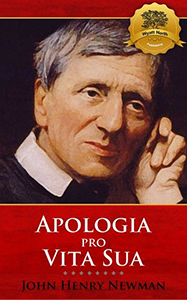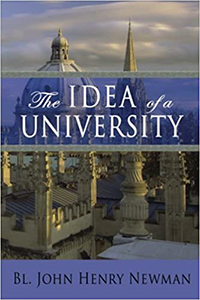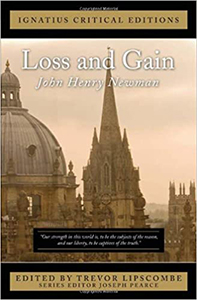
THE complete works of Newman comprise thirty-six volumes. Perhaps it is better say that they were about forty, because the approximate figure somehow does not scare a novus homo so much as the precise figure.
These volumes dressed in their customary uniform dress of sober black cloth are a full book-shelf, a small library by themselves. In a long life-time of very nearly ninety years this voluminous output was achieved.
Curiously, these ninety years were also very nearly the ninety years of the nineteenth century. You can count them one, two, three, and so on for the century as also for Newman. In the forty-fifth year of the century (as also of Newman’s life) there occurred the great, and now historic, turning-point of his long life.
He was received into the Catholic Church.




For master of literary precision as Newman was, even this little matter of count fell out with precision. There are two quite distinct parts of his life; they are exactly equal; they are the Anglican half on the one side, and the Catholic half on the other.
Today, one hundred years after the climax of Newman’s career, the world can consider him dispassionately, away from the din and heat of the fray.
The thirty-six (or nearly forty) volumes remain. Slow and steady have appeared the reprints of them. Not by any means a writer for the million. Newman cannot claim a vogue like, say, his contemporary Dickens, who also counts up to a standard edition of thirty-six volumes. Newman, whatever the select condition of his following, cannot be called literature in the Dickensian sense at all. Dickens, the novelist, was first and last a literary man; Newman, the writer, never intended to be a literary figure at all. His lack of desire in this respect is evidenced from any text-book of the Nineteenth Century literature.
Let us take for example, that omnivorous commentator on literature and literary men, Professor Saintsbury. He places Newman in the eighth chapter of his History of Nineteenth Century Literature. Bentham, John Stuart Mill, Hamilton, Mansel, Maurice, Keble, Malthus, Pusey and others antecede Newman; and the chapter is on Philosophy and Theology. However quiet these others may lie in the Saintsbury pigeon-hole Newman cannot be wholly there. However true it is that his preoccupations were philosophical and theological, Newman, by the peculiar compulsions of his career, enterprized the kinds of writing which are the preserve of the literary man.
His writings are of many sorts. He produced essays, sketches, a couple of novels, a play in verse, literary criticism, an autobiography which is also a work of controversy, a volume of verse later collected, volumes of sermons, (some called Plain and Parochial, others University, and yet others Sermons to Mixed Congregations), facts, pamphlets, works of history sacred and secular, magazine articles, lives of the saints, treatises and letters which were later assembled for his biography.
According to this classification, the philosophy and theology, into which Professor Saintsbury pigeon-holed Newman, is got out the way. But the philosophical and theological aspects traverse Newman’s works. This double thread runs through the whole output.
A Grammar of Assent, as an enquiry into the metaphysic of thought and belief, if philosophy or nothing but Newman in the full title called it an essay. The more solemn term would be treatise. The Idea of a University is long enough to be printed as a separate book and the work is one of the few notable contributions to the discussion of the nature and scope of university education. But all that matter was delivered as lectures, for Newman was a noted preacher and public lecturer of the day. His most famous sermon, The Second Spring, an ecstatic encomium and aspiration on the Catholic Revival, is a pulpit deliverance but its lyric exultation and noble rhetoric are such that it reads also with the same effect as it was heard with. Macaulay knew it all by heart, word for word and every word.
The Apologia Pro Vita Sua, now generally considered “Newman’s masterpiece, bears also this double front. Begun as a defence and as a counter-thrust against Charles Kingsley, it is controversy and it is also the most finished polemic in English literature. But the confutation of Kingsley being quickly achieved together with the dispatch of that misguided challenger into limbo, the work broadened out into the history of Newman’s religious opinions and beliefs and at once signalised itself as a superb piece of autobiography and an unparalleled revelation of the soul.
Several things in Newman are unique. The Apologia is one of them. The Idea of a University is another. The Dream of Gerontius, that moving poetic drama of the soul of man on its return journey emphasised further in its greatness by the elevating musical setting of Elgar, is a third. In a small way even the hymn Lead, Kindly Light has this mark of a lone specimen. All hymn-books cull it. It is the hymn of a precise mood. It is a prayer for light amid the encircling gloom. It was the mood of Newman groping his way amid the Protestant gloom. But Catholic choirs, singing to Catholic people set in a blaze of the light of truth, forget themselves and sing this hymn with much feeling. That, we may take it, is the acid test of a hymn born not to die.
Another notable production of Newman’s was the volume first called Lectures on Catholicism in England, later The Present Position of Catholics in England, The contents were delivered as lectures to packed audiences but a reader of the present time does not feel them to be the spoken work. These lectures are good writing. Newman himself, never too appreciative of his products, thought them ‘the best written of all his works.’ He confessed so to Dean Church. The subject is that hydraheaded monster, No-Popery. As a Catholic of five years standing at the time, Newman had to consider the whole vast field of Protestant prejudice against the ancient Faith which made England. The deliverances are in a new manner; in a consistent vein of pungent satire, diverting irony, consummate sarcasm, in all which also Newman was a great master.
Miss Giberne, one of the audiences of these lectures, set down in her Diary that ‘peals of laughter were audible from outside the hall’. Newman was reputed as one notoriously reserved in language and self-restrained. Here his dry humour broke its bounds. There are many delightful reductions to absurdity of the Protestant bias which no unbiassed enthusiast of constructive irony will willingly let pass into oblivion. Of many inimitable things in this work the prime favourite is the famous Benediction passage which describes a Protestant coming into a Benediction Service and discovering to his complete satisfaction that it is a fraud and a hoax. Read out even today, this droll study does not fail to fetch its peals of laughter. Miss Giberne spoke the truth.
In spite of these excellences of the English pen in the few works already named (and the many that have to be passed over without even mere reference), the Newman output of nearly forty volumes may not draw the multitude. The omnia opera have rather too much of the air of dedicated scholarship and study and the sense of much close pre-occupation with the academic world of learned books and things, to draw the man in the street, the ordinary man of the time, everyman, the common reader, the average person. Newman, for these persons, is and remains, the author of a goodly array of immortal separate passages of English prose.
Anyhow that is not a bad start with Newman. To help in this matter Newman’s devoted publishers, Longmans, have had put on the market a book of Literary Selections front Newman edited by a Sister of Notre Dame, and with not a little courage, set this anthology down in their series of Class-Books of English Literature. One may then entertain the hope that the Class-Book is used in some classes of the schools and colleges of the English–speaking world. Later on, a more ambitious selection came to be issued by Sheed and Ward for the use of adults: the Newman Synthesis prepared by Fr. Przywara and representing the choice of Newman’s complete thought and teaching. That would be the second stage on the approach to Newman.
This helpful work would, among other things, make us understand how, when Newman tried his hand at fiction, his Callista had to be a Tale of the Third Century, as the full title is at pains to explain; and how also Loss and Gain, though portraying his own time (‘persons and things, that I knew—but if I were to attempt a fashionable novel, I should make a fool of myself, because I do not know men of fashion’) had to be the story of Mr. Charles Reding, searching for the True Church and at last gaining it but not without the loss of other things.
Mr. Reding is Newman: the real thing dressed up as fiction. Even Callista is a facet of Newman. Her conversion to Christianity from paganism is the prime fact of her life. All the thirty-six volumes converge on this prime problem. Where lies the truth of the Christian revelation? That is why secularists, mere literary critics, anti-Christian sophists, anti-Catholics fanatics, all seek to seek to deny them the name of literature.
But this pious aspiration of the secularists and the rationalists cannot be realized because of Newman’s matchless and unmatchable power over the English word. The structure, verve rhythm and lure of his sentence are the glory of English prose. A shorter description of these is to call it his style. However unwilling a man would be to concede other excellences, every man with a sense of the craft of English prose must concede to Newman’s style.
This style was not built in a day. It grew. It became diversified; there is not one style of Newman but several. But whether singular or plural, there was one heart and core of the marvel: the exactness and precision of his word and the exact and precise place and order of his word. By a rare felicity he fetched the very best word; and he set it, no less felicitously, in the very best place. But he never used the word for the word’s sake, but for its faithfullest conveyance of his thought. He always held for the supremacy of the thought. The word subserved the thought.
The Newmanian style has many a splendour; an eloquence like a torrens in austro or a packed terseness; a spiced pungency or a linked sweetness long drawn out; a roll on roll of rhythms or a series of sharp contrasts; a brisk succession of factualities or a long glitter of forceful figures; virginal passion or the presevering achievement of beauty. But all these fall behind his God-given gift of the exact word in exact order.
By virtue of this gift there fail behind him, indeed far behind him, the reputed contemporary masters of style; Ruskin, Macaulay’ Carlyle, de Quincey, Pater and the other professional stylists. This magic of the word, however, did not come to Newman like the rabbits out of the magician’s hat. His days and nights were given to the revision of the word, to the excision and betterment of his phrase, to the cast and recast of his sentence.
It is true that, caught in a special overflow of his feelings, his pen ran away with him. The Apologia was written with this flying pen: calamus scribae velociter scribentis. On consecutive Thursdays, between April 21 and June 2, (in the year 1864) he dashed off the seven parts of the greatest controversial work and the greatest spiritual autobiography in the language.
But this lightning speed was not Newman’s preference. Of the Grammar of Assent he wrote: ‘I have aimed at writing it these twenty years. I have made more attempts at writing it than I can enumerate.’ The actual writing took him three years and he wrote to Sister Imelda Poole: ‘How many times I have written it—but so I have most of the books I have published.’ To Edward Bellasis, the dedicatee, he wrote: T have written and rewritten it more times than I can count. I have now got up the highest point—I mean, I could not do better, did I spend a century on it, but then, it may be—bad is the best’.
Is Newman then the greatest master of Victorian prose? Is Newman perchance the greatest master of English prose?
Competent judges, who can rise above the bias of partisanship have had it in them to answer in the affirmative. With the passage of time removing the acerbities of the conflict, more and more authorities have ranged themselves on the side of justice to the genius of Newman. If he had not made the epoch-making decision of 1845, the centenary of which event pressed critics to a re-considered estimate of Newman’s pen, there would have been no practical doubt of his primacy. He would have continued to be what he was to the majority religion in England at the crisis of his career: the leader of a century’s thought and self-expression. All that English world of the Anglican Settlement would have succumbed to Newmania, as their entire intellectual class did before the climax of 1845.
But in spite of the loss of a whole world, Newman enjoyed the gain of his own soul. He had no regrets. The truth had made him free. Within the Catholic Faith, the home of the soul of Newman as of every other man, an unprecedented greatness was in time thrust on this penman born great: the red hat and red ensemble of a Lord Cardinal of the Roman Church.
One of these greatnesses suffice for immortality. The two together stun the beholder. Being the greatest of the prose-writers and a Cardinal is a little too much to take in together. It is as if Shakespeare’s genius was not emphasised enough by his supremacy as the world’s greatest poet and had it submerged in an accession, as in the case of Breakspeare, to the Primacy of Peter. But there need be no cleavage in the greatness of Newman. The Cardinal did not over-power the genius.
The long labour of his pen was to seek the Church of Christ, and finding, glorify it. And so great a penman of the Church could have his meed only in a throne and a princedom.